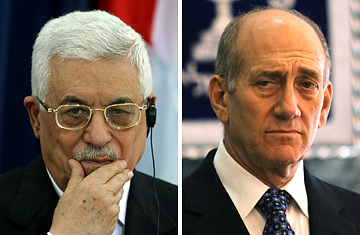
Left; Palestinian President Mahmud Abbas and Israeli Prime Minister Ehud Olmert
When Middle East adversaries meet in Annapolis this week, will it be a peace conference, or rather a conference that ends all peace? Nearly 60 years since the outbreak of the Arab-Israeli conflict, that may well be the stark choice that awaits the conference's participants.
Doomsday predictions, of course, have long been a staple of Middle East commentary. Every negotiation seems to be the "last chance" for peace. Every crisis seems to threaten the outbreak of a major war, if not the great apocalypse. But there's reason to pay attention to the warnings this time. The 1979 Camp David peace treaty between Egypt and Israel planted the seed for resolving the core of the conflict: the creation of an independent Palestinian state in the West Bank and Gaza Strip, Arab territories seized by Israel in the 1967 war. But if the Annapolis conference fails to provide urgently needed nourishment, the two-state solution and its hope of peace may die forever.
The once-promising dialogue between Israelis and Palestinians to settle their dispute is hanging by a thread. Despite 14 years of mutual recognition and on-off peace talks, they have failed to agree on the formula by which they can live together side by side in separate states. Israeli settlements in the West Bank have proceeded apace, while, until recently, Israeli leaders seemed inclined to unilaterally decide the borders and other unresolved issues. Palestinian leadership has become badly splintered, with the pro-negotiations camp represented by the late Yasser Arafat's Fatah party increasingly overwhelmed by the Islamic fundamentalist group, Hamas.
In the broader context, the political and sectarian chaos that followed the toppling of Saddam Hussein is a painful reminder that transforming Arab dictatorships into pro-Western democracies will not be simple. The Iraqi quagmire has helped Iran rise as a leader of forces opposed to a Pax Americana, with the clout to play a spoiler role in Iraq, Palestine, Lebanon and elsewhere in the Middle East. The prospect that Iran could assemble a nuclear weapon in the coming few years, and the possibility that the U.S. may launch preemptive military strikes on Iran, are ominous signs of how the Middle East can still take further turns for the worse.
Annapolis has been met with understandable skepticism, and concern that failure to achieve anything might actually trigger a final descent into a darkness. Yet, there are reasons to hope that Annapolis instead could be the peace conference to end all peace conferences, if success is defined as the launching of a serious new round of comprehensive negotiations based on a solid consensus for realistic solutions.
There is an Arab acceptance of Israel and a commitment to a comprehensive peace settlement that is unprecedented in the six decades of the conflict. The Arab peace initiative of 2002, which was re-launched at an Arab summit this year, promises full peace with Israel in return for Israel's withdrawal from Arab territories. In Israel, there has been a fundamental shift in thinking at least about the efficacy of occupation, which led former Prime Minister Ariel Sharon, the patron of the settler movement, to withdraw Israeli troops and settlers from Gaza.
